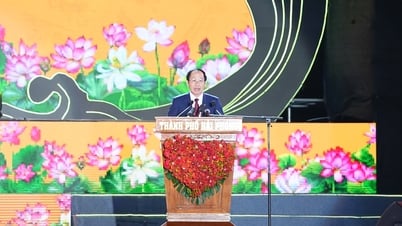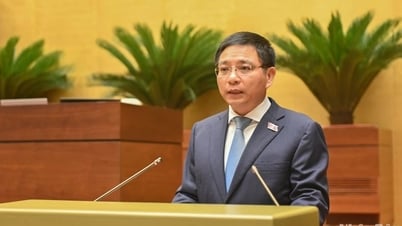
The abolition of secondary school diploma does not affect students' learning opportunities.
Regarding the draft Law amending and supplementing a number of articles of the Law on Education that has just been announced for agencies, organizations and individuals to contribute their opinions, the Ministry of Education and Training provides more information on the necessity of amending and supplementing the Law on Education and important contents.
Vocational education is a level of education.
One of the notable new points in the draft Law is to establish vocational education as a level of education in the national education system, including two levels: Vocational secondary school and college. In this level, learners are trained at three levels: Elementary, intermediate and college.
Specifically, vocational secondary school is for students after junior high school, integrating basic general cultural knowledge and vocational skills, aiming to achieve elementary or intermediate level; while college is for students after high school or equivalent, training at college level.
According to the Ministry of Education and Training, this design ensures the structure of the national education system in the direction of clearly distinguishing levels of education, clearly classifying training levels and enhancing openness and connectivity, in accordance with the national qualifications framework and international practices.
No junior high school diploma
Regarding regulations on diplomas and certificates, the draft Law stipulates the abolition of junior high school diplomas and assigns the authority to junior high school principals to confirm completion of the junior high school program instead of the district-level head of the education and training department granting junior high school diplomas.
In addition, the draft also stipulates that the authority to grant high school diplomas to high school principals is assigned instead of the director of the Department of Education and Training granting high school diplomas.
According to the Ministry of Education and Training, abolishing the issuance of junior high school graduation certificates and decentralizing the authority to confirm completion of general education programs is an inevitable requirement to fully institutionalize the policies of the Party and State, meet the practical needs of education management and approach international practices.
This adjustment aims to promptly institutionalize the policy of strong decentralization and delegation of power in state management in the spirit of Resolution 27-NQ/TW and Conclusion 137-KL/TW of the Politburo. The empowerment of heads of educational institutions in certifying and granting degrees is a concrete step in clearly defining the authority and responsibility between the central and local levels, between management agencies and implementing agencies.
This adjustment is in line with the trend of modern administration, streamlining the apparatus, increasing operational efficiency, contributing to eliminating unnecessary administrative intermediaries, shortening processes, reducing pressure on district and provincial management agencies, and increasing autonomy and accountability of schools.
In addition, this adjustment is also consistent with the nature of universal secondary education as a social policy, not a training system with a degree output. Confirming the completion of the curriculum is enough to serve the purpose of streaming and transferring levels, and there is no need to maintain the administrative degree granting mechanism.
According to the Ministry of Education and Training, currently developed countries such as the US, UK, Finland, and Canada do not issue junior high school diplomas but give the authority to confirm learning outcomes to principals, using them as a basis for continuing to higher education or career orientation. Therefore, this adjustment aims to approach international practice and facilitate integration.
Confirmation of program completion is sufficient basis for learners to transfer to another level.
According to the draft Law, one of the notable changes is that the authority to grant high school graduation certificates is assigned to the school principal, instead of the director of the Department of Education and Training as it is currently. This is to implement the policy of decentralization and delegation of authority, in compliance with the principle of "where training is provided, where diplomas are granted".
The draft also stipulates that students who complete the junior high school program will have their transcripts confirmed by the school principal as having completed the junior high school program, instead of the district education and training department head granting the junior high school diploma as is currently the case.
The Ministry of Education and Training also affirmed that the regulation of abolishing the secondary school diploma and assigning the authority to confirm program completion to school principals does not affect the rights and learning opportunities of learners.
Replacing the degree with a certificate of program completion still ensures full legal basis for learners to transfer to another level, learn a trade or continue their studies as desired.
According to the Ministry of Education and Training, the Education Law No. 43/2019/QH14 was passed by the 14th National Assembly on June 14, 2019, effective from July 1, 2020. During its implementation, the Education Law has contributed to creating an important legal corridor for the development of the national education system.
However, practice also shows some shortcomings and limitations that need to be further reviewed, revised and supplemented, focusing on some contents such as: Decentralization, delegation of authority and autonomy mechanism of educational institutions; levels of education of the national education system...
Faced with the above limitations and shortcomings, the Politburo issued Conclusion No. 91-KL/TW, which determined to "focus on reviewing, amending, supplementing, and perfecting mechanisms, policies, and laws on education and training, removing bottlenecks..."; "increasing autonomy, enhancing accountability, and promoting democracy in educational and training institutions"...
In 2024, the Prime Minister signed Decision No. 1705/QD-TTg approving the Education Development Strategy to 2030, with a vision to 2045, which once again emphasized the task and solution of "reviewing and perfecting the legal system, mechanisms, policies on education, training and related fields in a scientific, modern, synchronous, interconnected direction, in line with the international integration process and practices in our country, creating a complete legal corridor for the development of education and training".
In order to remove obstacles and difficulties in the practical implementation of the Law on Education, and at the same time, to be consistent with the newly promulgated legal regulations in the process of implementing the policy on reorganizing the state apparatus and reorganizing administrative units at all levels, it is necessary to amend and supplement a number of articles of the Law on Education.
Source: https://baotuyenquang.com.vn/viec-bo-cap-bang-thcs-khong-anh-huong-den-co-hoi-hoc-tap-211692.html


![[Photo] President Luong Cuong awarded the title "Heroic City" to Hai Phong city](https://vphoto.vietnam.vn/thumb/1200x675/vietnam/resource/IMAGE/2025/5/13/d1921aa358994c0f97435a490b3d5065)

![[Photo] President Luong Cuong attends the inauguration of the international container port in Hai Phong](https://vphoto.vietnam.vn/thumb/1200x675/vietnam/resource/IMAGE/2025/5/13/9544c01a03e241fdadb6f9708e1c0b65)

![[Photo] Prime Minister Pham Minh Chinh receives Ambassador of the French Republic to Vietnam Olivier Brochet](https://vphoto.vietnam.vn/thumb/1200x675/vietnam/resource/IMAGE/2025/5/13/f5441496fa4a456abf47c8c747d2fe92)
![[Photo] Many people in Hanoi welcome Buddha's relics to Quan Su Pagoda](https://vphoto.vietnam.vn/thumb/1200x675/vietnam/resource/IMAGE/2025/5/13/3e93a7303e1d4d98b6a65e64be57e870)

















































































Comment (0)